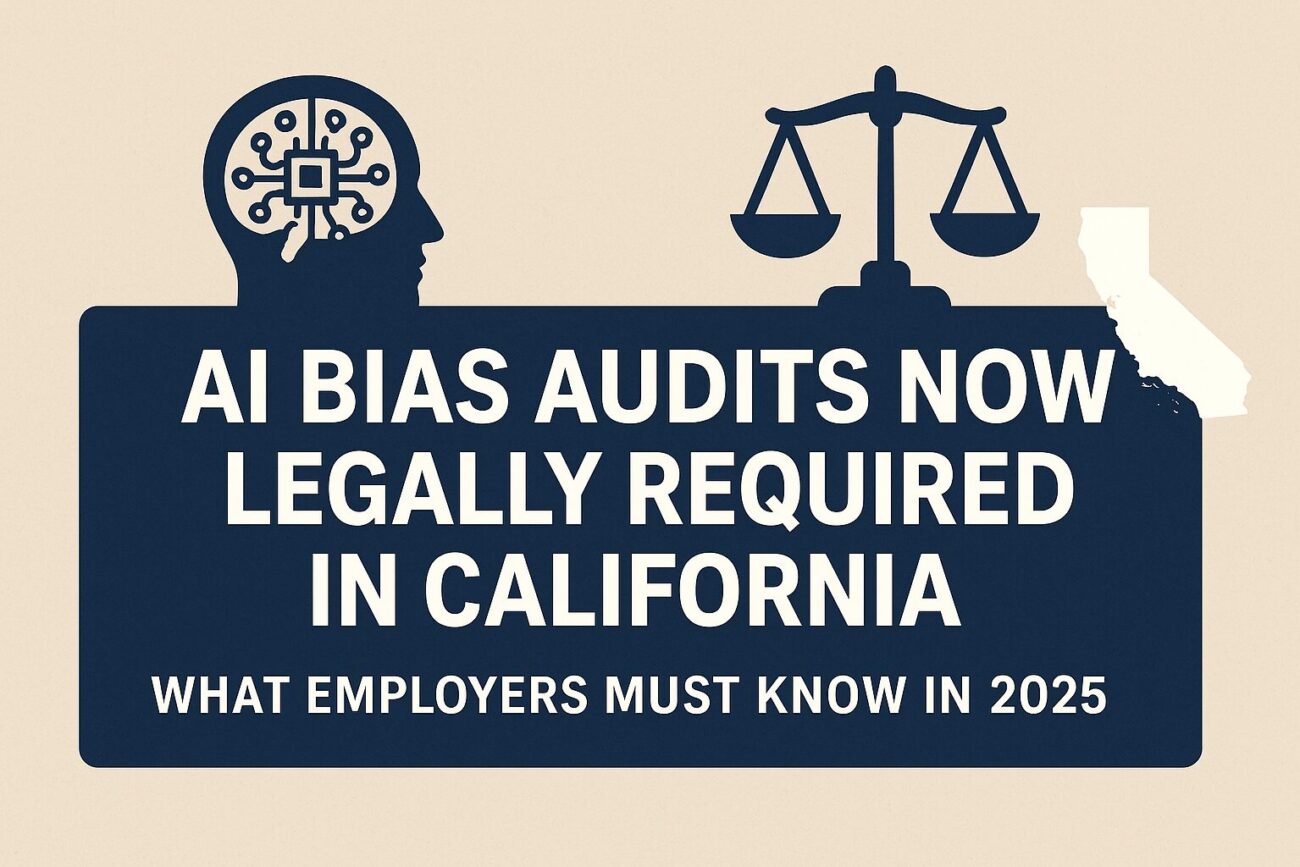Introduction
As artificial intelligence (AI) becomes embedded in hiring, promotions, and workplace decisions, California has taken a bold step to regulate algorithmic fairness. Starting October 1, 2025, employers using AI-powered tools must comply with new rules under the Fair Employment and Housing Act (FEHA)—including mandatory bias audits, expanded recordkeeping, and liability for third-party vendors. This article breaks down what the law requires, how it impacts businesses, and what steps employers must take to stay compliant.
🧠 What Is an AI Bias Audit?
An AI bias audit is a formal evaluation of automated decision systems (ADS) to detect and mitigate discriminatory outcomes. These audits assess whether AI tools:
- Disproportionately impact protected groups (e.g., race, gender, age, disability)
- Use proxies like ZIP codes or speech patterns that correlate with protected traits
- Apply selection criteria that result in disparate impact
Under California’s new regulations, lack of proactive bias testing may be used against employers in legal claims.
📜 Key Requirements Under California’s New AI Law
✅ Mandatory Bias Audits
Employers must conduct regular audits of AI tools used in hiring, screening, promotions, and performance evaluations. This includes tools that:
- Rank or score candidates
- Analyze facial expressions or voice in interviews
- Predict leadership potential or job fit
- Target job ads to specific demographics
✅ Expanded Recordkeeping
All ADS-related data—including input variables, scoring outputs, and vendor documentation—must be retained for at least four years, doubling the previous requirement.
✅ Vendor Accountability
Employers are legally responsible for discriminatory outcomes caused by third-party vendors. Contracts should include:
- Bias audit disclosures
- Indemnification clauses
- Transparency obligations
✅ Reasonable Accommodation
AI tools must not disadvantage individuals with disabilities or religious needs. Employers must offer alternative assessments or modify tools accordingly.
📊 Comparison: Traditional vs. AI-Regulated Hiring
| Feature | Traditional Hiring | AI-Regulated Hiring (2025) |
|---|---|---|
| Bias Testing | Optional | Legally Required |
| Vendor Liability | Limited | Employer Responsible |
| Record Retention | 2 Years | 4 Years |
| Disability Accommodation | Manual | Must Apply to AI Tools |
| Criminal History Screening | Manual | Restricted via AI |
🌍 Who Must Comply?
The law applies to:
- Businesses with 5+ employees
- Government agencies, cities, and districts
- Nonprofits (except religious institutions)
- Recruiters, staffing firms, and HR tech vendors
Even if AI tools are used indirectly or partially, employers are still liable for outcomes.
⚠️ Risks of Non-Compliance
Failure to comply may result in:
- Fines and lawsuits
- Civil liability for damages
- Reputational harm
- Loss of public contracts or funding
Importantly, intent is irrelevant—even unintentional bias can trigger enforcement.
📈 SEO Tips for AI Compliance Content Creators
✅ Search-Friendly Titles
- “California Mandates AI Bias Audits in Hiring”
- “New AI Employment Law: What Businesses Must Know”
✅ High-Impact Keywords
- “AI bias audit California 2025”
- “FEHA automated decision systems”
- “AI hiring compliance law”
✅ Metadata Optimization
- Alt Text: “AI system being audited for bias in employment decisions”
- Tags: #AIBiasAudit #CaliforniaAIRegulation #FEHA2025 #AICompliance #HiringTechLaw
Final Thoughts
California’s new AI bias audit law sets a precedent for ethical, transparent, and accountable AI in the workplace. Employers must act now to audit their systems, update vendor contracts, and train HR teams. In the age of automation, fairness isn’t optional—it’s enforceable.
💬 Need help crafting compliance guides, audit checklists, or vendor review templates? I’d be honored to assist—one algorithm at a time.

